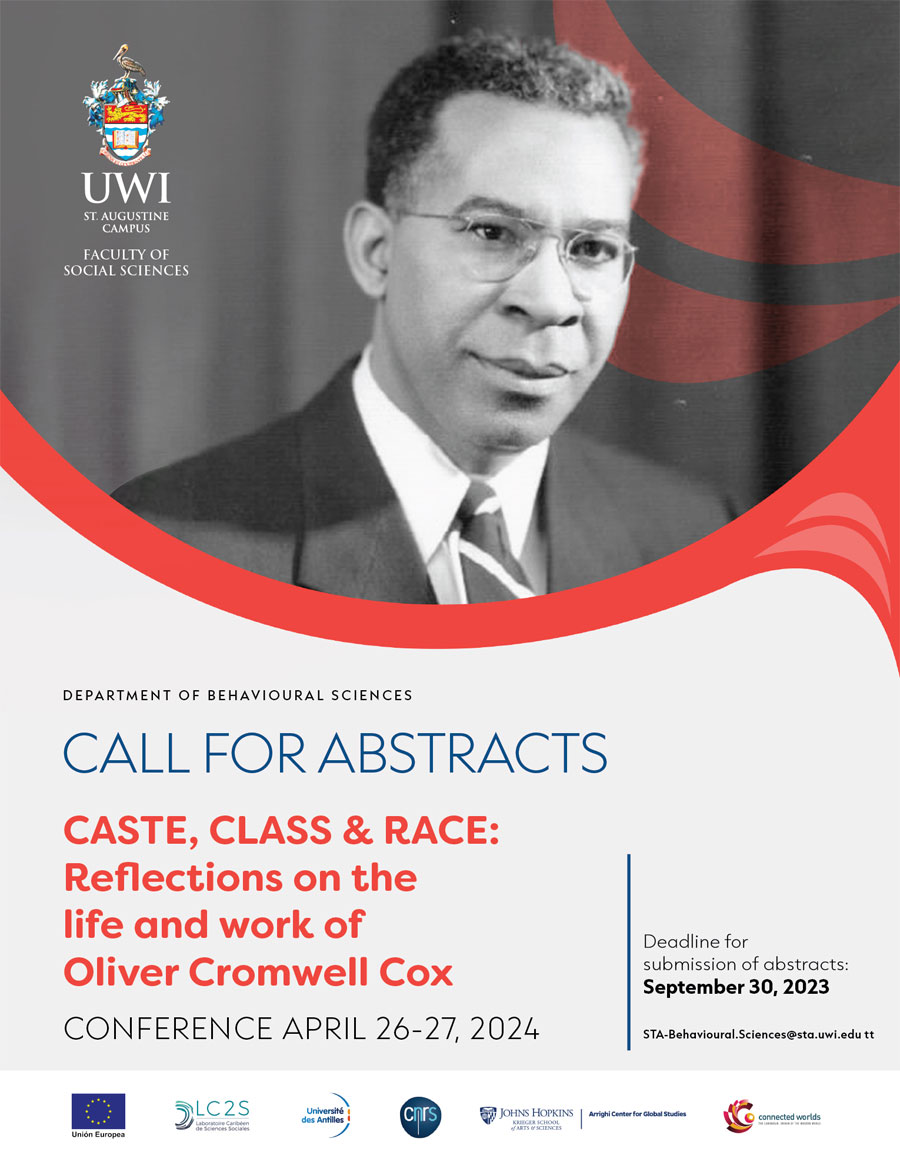Caste, Class & Race: Reflections on the life and work of Oliver Cromwell
CALL FOR ABSTRACTS
Caste, Class & Race: Reflections on the life and work of Oliver Cromwell
Conference: April 26-27, 2024
Deadline for submission of abstracts: September 30, 2023
E-mail: STA-Behavioural.Sciences@sta.uwi.edu.tt
Hosted by: The University of the West Indies, St. Augustine Campus – Department of Behavioural Sciences
Oliver Cromwell Cox was a Trinidad and Tobago born scholar, whose scholarly writings made significant contributions to mid – 20th Century sociological thought. Born on August 24, 1901, in
Port of Spain, he attended Saint Thomas Boys’ School before migrating to Chicago Illinois, in 1919. Despite his comprehensive colonial education, it was not accepted in the USA, and he completed a two-year high school diploma in 1923, a law degree from Northwestern University three years later and Masters in Economics from the University of Chicago in 1932. In 1929, he was stricken with polio, which confined him to a wheelchair for the rest of his life and thwarted his plans to study law and return to Trinidad and Tobago. His scholarly contributions deepened with the completion of a PhD in sociology at the University of Chicago in 1938, professorships in
economics (Wiley College) and in sociology (Lincoln University, Missouri and Wayne State University, Michigan). His professional contributions during this time extended to examinations of African Americans – the spatial and cultural facets of their work, marriage and family lives, and the broader connections to social and economic life in the United States. This body of work predated later analyses on sex roles and the intersections of race, class and gender which would become more popular in the 1970s and 1980s with the emergence of women’s studies programmes.
As a sociologist his work challenged dominant thought and practices related to the social and economic organization of race relations within Western societies. His Marxist influences prompted the use of socio-historical and comparative analyses with more nuanced explorations of race and racial inequalities. His critique of the caste school of race relations, more specifically the classic publication of Gunnar Myrdal, The American Dilemma, argued for the treatment of caste and race as two distinct social systems, which could not be explained in terms of the other. In so doing, he became one of the first United States sociologists to disrupt the caste school of race relations and to situate experiences of racism within the class dynamics of capitalism, as a colonial and global system of power. Through his later work on Capitalism, he connected understandings of white supremacy, capitalism, racism, and intersectionality within the United States, to global concomitants and relationships that were developed and organized within existing world systems. Indeed, Cox’s work preceded much of the later work on world systems theory as developed by Immanuel Wallerstein and others in the 1970s.
Cox’s contribution to global sociology is therefore distinct. Some of his most recognized writings including the Modern Caste School of Race (1942), Caste, Class, Race (1948), Foundations of Capitalism (1959), Capitalism and American Leadership (1962), and Capitalism as a System (1964), have been published in many editions, languages and with ongoing reviews of his contributions to the field. Of these publications, his authoritative work Class, Race and Caste published by Doubleday in 1951, was sold out in six weeks and received the George Washington Carver Award. The caste explanation of US race relations emerged once again with the publication of Isabel Wilkerson’s 2020 prizewinning book CASTE, which put forward similar arguments to Myrdal although perceived as original. This brought Cox’s work once more to public attention.
For most of his career however, Cox’s work was deliberately marginalised and resisted. His famous work on Class, Race and Caste was mostly downplayed and removed from public discourse, which negatively impacted his career. To date, Oliver C. Cox is virtually unknown in his place of birth Trinidad and Tobago and indeed in the anglophone Caribbean, to ordinary citizens and sociologists alike.
FOCUS AND AREAS OF INTERROGATION
The work of Oliver Cromwell Cox, while not significantly represented within Caribbean scholarship and teaching, presents a critical framework through which we can re-engage some of the historical and contemporary issues that continue to impact global citizens. The proposed conference on Oliver Cox allows scholars to unpack and think through some of these contentions, while increasing the visibility and applicability of his work. These may include, but are not limited to the following:
- Oliver C. Cox – His Life, Upbringing and Work
- Race and Class in Contemporary Caribbean Social Thought
- Race and Caste
- Oliver C. Cox and Global Sociology
- Racial Capitalism, the Caribbean, and the World
- Radical traditions in the Caribbean
- Oliver C. Cox and his significance for United States Sociology
- Intersectionality, Feminist theory, and Caribbean Sociology
- World Systems Analysis and the Caribbean in the 21st Century
- Legacies of ‘Caste’ in the Caribbean
- Oliver C. Cox and The Sociology of Marriage and the Family
- Contemporary trends in the sociology of work and labour
- Critical Sociology and the contemporary regional and global context
ABSTRACT SUBMISSION
We invite the submission of 300–500-word abstracts for panels and roundtables on topics relevant to the theme, both in the sense of a specific geographic location or the wider conceptual argument. We also welcome proposals that are socio-historical, theoretical, or conceptual, empirical, and interdisciplinary. Proposals or queries should be submitted to STA-Behavioural.Sciences@sta.uwi.edu under the heading ‘Oliver C. Cox Conference 2024’.
Timelines:
- Deadline for Abstract Submission: September 30, 2023
- Decision on Abstract: October 31, 202
Oliver C. Cox’s books can be purchased by emailing requests to the Oliver Cromwell Cox Institute at info@oliverccox.com

